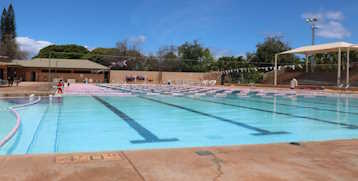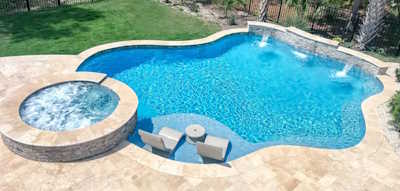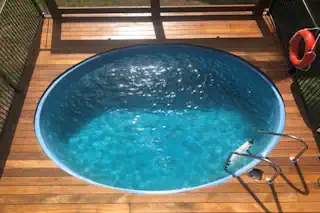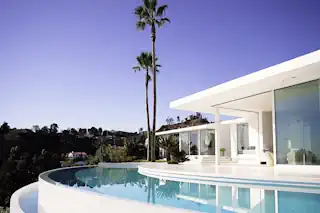Exploring Types of Swimming Pools: A Comprehensive Guide
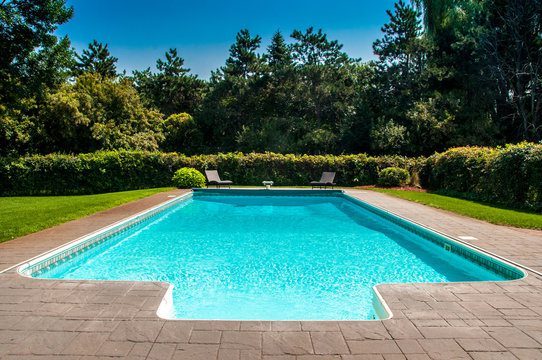
Picture this: a warm summer day, the sun’s gentle rays kissing your skin, and the delightful shimmer of azure waters. No, this isn’t a dream—it’s the reality for millions of families and swimming enthusiasts who have made the decision to invest in their very own swimming pool. Swimming pools aren’t just about lounging and relaxation; they have become a symbol of fun, fitness, and a focal point for social gatherings. But with so many types of swimming pools available, how do you, as a prospective pool owner, make the right splash?
In this extensive guide, we’ll peel back the layers of various swimming pool types, each offering unique features tailored to different lifestyles and preferences. Whether you’re aiming for the lap of luxury or simply want a refreshing backyard dip, read on to find out which pool type aligns best with your swimming aspirations.
Types of Swimming Pools
When it comes to selecting the perfect swimming pool, understanding the different types available can help you make an informed decision. Here’s a list of the various swimming pool types you might consider:
- Inground Pools: Built directly into the landscape, inground pools come in various materials such as concrete, vinyl, and fiberglass, each providing distinct advantages in terms of durability and design flexibility.
- Above Ground Pools: A cost-effective option that provides mobility and convenience. Above ground pools are perfect for homeowners who seek a temporary solution or lack the space for a permanent pool.
- Infinity Pools: Also known as vanishing edge pools, they create a visual effect of water extending into the horizon. They are ideal for properties with stunning views and owners who desire a touch of luxury.
- Lap Pools: These are long and narrow pools designed for fitness and health purposes, allowing for uninterrupted lap swimming.
- Family Pools: Designed with family fun in mind, these pools often include features such as beach entries, slides, and shallow ends for kids.
- Plunge Pools: These are small, deep pools suitable for cooling down and refreshing dips rather than for swimming laps or entertaining large groups.
- Natural Pools: Designed to imitate ponds or natural bodies of water, they are eco-friendly and blend seamlessly with the surrounding landscape, incorporating natural plants to filter the water.
- Architectural Pools: These pools are often custom-designed to match the architecture of the home, reflecting its style and often using the same materials for a cohesive look.
- Saltwater Pools: They utilize a saltwater chlorination system which is gentler on the skin and eyes, presenting a desirable alternative to traditional chlorinated pools.
- Kiddie Pools: Specially designed for the little ones, kiddie pools are typically shallow and small, ensuring a safe and controlled environment for children to play and splash around in. They come in a variety of fun shapes and themes and often feature colorful designs to engage young swimmers’ imaginations. Kiddie pools provide an ideal introduction to water before graduating to larger family pools.
In Ground Pools: The Time-Tested Classic

In ground swimming pools are the crown jewel of pool types, known for their longevity and the freedom to create customized designs that complement your home’s aesthetics. If you’re looking to integrate a pool seamlessly into your property, an in ground pool might be the selection for you.
Description
These pools are constructed by digging a hole into the ground and then lining it with a variety of materials such as concrete, fiberglass, or vinyl. The versatility in material selection offers different aesthetic and functional benefits, from traditional concrete’s durability to fiberglass’s smooth, non-abrasive surface.
Cost Considerations
The initial investment for an in ground pool is considerably higher than above ground options. However, it’s important to note that these pools can significantly add to the resale value of a property and are generally more durable, which may lead to lower long-term costs.
Above Ground Pools: Quick Setup, Lasting Impressions
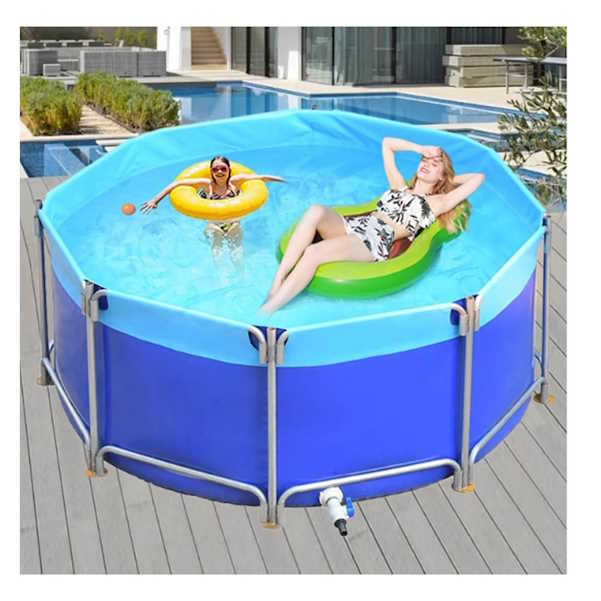
For those looking for the joys of a pool without the commitment of a major construction project, above-ground pools provide a compelling alternative. These vessels offer portability and affordability without skimping on the fun.
Description
Above-ground pools are free-standing structures that sit on top of the ground. Their walls can be made of steel, aluminum, or resin, and they’re lined with a vinyl, PVC, or peppered/enameled steel.
Installation Process
Unlike in-ground pools, an above ground pool has a relatively straightforward installation process. They require a level surface and can often be set up in a matter of days, making them an ideal choice for those who want quick access to swimming.
Maintenance Tips
While they may not have the same life expectancy as in-ground models, above-ground pools are generally easier and more cost-effective to maintain. Regularly checking for rust or wear and tear on the pool’s walls and ensuring the structure is balanced on the ground will significantly extend the above ground pool life.
Infinity Pools: The Endless Horizon
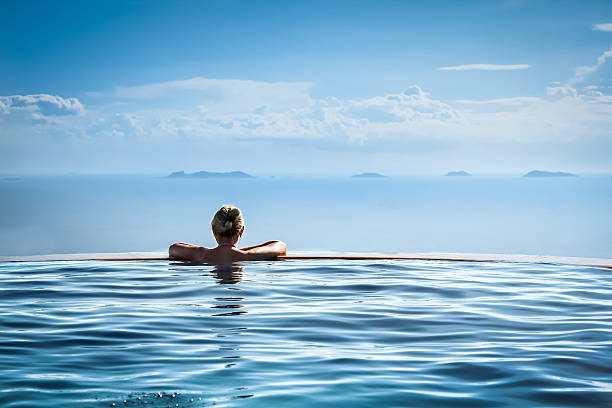
Infinity pools, often found in luxury resorts and high-end homes, are renowned for their striking visual effect that seems to merge the pool’s edge with the surrounding landscape. This type of pool is perfect for property owners who aim to capture the essence of opulence and tranquility.
Description
Infinity pools are designed with one or more edges that are lowered slightly below the water level, allowing water to flow over into a catch basin, which recirculates it back into the pool. This creates the illusion of a continuous surface that extends into infinity, hence the name.
Cost Considerations
The stunning effect of an infinity pool comes with a price. Building and maintaining such a pool requires precise engineering and high-quality materials. The cost includes the installation of the catch basin and the sophisticated circulation system needed to maintain the seamless edge.
Installation and Care
Installing an infinity pool typically entails extensive site preparation and careful architectural design to ensure the illusion is effective and the water flows correctly. Like all pools, they require regular maintenance, but keep an eye on the catch basin and overflow system since these areas are vital for the infinity effect and can be affected by leaves and debris.
Ideal Locations
Given the pool’s visual appeal, it’s usually best placed in areas with stunning views, like overlooking a cityscape, mountains, or a beachfront. The pool’s edge provides a mesmerizing intersection between the man-made and natural environment, making it an ultimate statement piece of landscape design.
Lap Pools: The Serene Swimmer’s Sanctuary

Lap pools cater to those whose love for swimming transcends leisure; they are built for serious swimmers who value fitness and rhythm. Here’s a detailed look at what makes lap pools a unique addition to your home.
Benefits for Health Enthusiasts
Lap pools provide a confined space that’s perfect for continuous swimming. They allow the swimmer to achieve a consistent stroke without having to turn around, ideal for cardiovascular exercise.
Space Requirements
Lap pools have narrower profiles than traditional pools but are generally longer, typically ranging from 40 to 75 feet. As such, they are an excellent space-saving alternative for those with smaller yards.
Design Options
Despite their elongated dimensions, lap pools can be aesthetically versatile. You can choose from various finishes and have the ability to add heating and lighting features to create an inviting environment for evening swims or dawn exercises.
Family Pools: The Heart of Home Recreation

Family pools are designed to be the centerpiece of backyard fun, catering to all ages with their versatile and friendly designs. These pools prioritize safety, convenience, and the flexibility to accommodate various activities from playful splashing to relaxed floating.
Safety Features
Family pools often include shallow areas perfect for young children, as well as safety steps, handrails, and non-slip surfaces to ensure a secure environment for family members of all ages.
Size and Shape Considerations
The size and shape of family pools can vary widely, with many opting for rounded corners and freeform designs that provide areas for both play and relaxation. They typically measure less than 30 feet in length, making them a suitable addition to most backyards.
Fun and Entertainment
To enhance the enjoyment, family pools can be equipped with features such as slides, diving boards, and basketball hoops. They also might include integrated seating areas or swim-up bars for adults to supervise while enjoying the water.
Heating and Lighting Options
For extended use throughout different seasons and times of day, family pools can be fitted with heating systems and vibrant lighting options, creating a warm and inviting atmosphere anytime.
By offering a place where memories are made and summer days are spent in laughter, family pools are the embodiment of leisure, entertainment, and family bonding within the sanctuary of home.
Plunge Pools: Compact and Therapeutic

Plunge pools are a nod to efficiency and are perfect for relaxation and hydrotherapy. Despite their modest size, these pools pack a punch in terms of functionality.
Space-Saving Benefits
Plunge pools are small and deep, designed for a quick plunge rather than a full swim. They can be as small as six to eight feet in length, meaning they can fit into the most compact of spaces.
Therapeutic Advantages
The depth of plunge pools makes them ideal for hydrotherapy, offering a place to relax and rejuvenate. Their smaller size means they heat up much faster, and as such, they’re an efficient solution for year-round enjoyment.
Cost Efficiency
With a smaller footprint and usually fewer installation and maintenance costs, plunge pools offer a cost-effective way to enjoy the benefits of a swimming pool without breaking the bank.
Natural Pools: Harmony with Nature

Most natural pools, sometimes referred to as “wild swimming pools,” offer a unique swimming experience that seamlessly merges with the landscape. These pools are filtered using plant life rather than chemicals, offering an eco-friendly alternative.
Eco-Friendly Features
A natural pool features a separate pool area filled with aquatic plants. These plants, along with beneficial bacteria, clean the water, and the result is a gentle, environmentally friendly swimming experience.
Maintenance Challenges
The organic nature of these pools means they do not provide the same sterile conditions as conventional pools. This requires a shift in mindset about maintenance, as you’ll be working with the pool’s ecosystem rather than against it.
Aesthetic Appeal
They are aesthetically stunning, often resembling a small pond or water body. Natural pools are perfect for homeowners who want a natural pool that not only refreshes but also adds to the beauty of their surroundings.
Architectural Pools: The Epitome of Design and Elegance
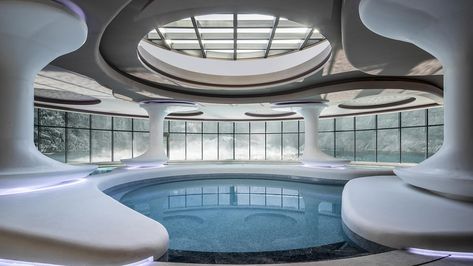
Architectural pools are tailored masterpieces that reflect the design ethos and style of a home, blending seamlessly with the property’s overall architectural statement. These pools are as much about aesthetics as they are about swimming, with attention to detail that turns them into central features of landscape architecture.
Design Integration
Every architectural pool is designed with the home’s architecture in mind, ensuring that materials, shapes, and water features complement the property’s style. They often use materials such as glass tiles, natural stone, or visually striking finishes that echo the design elements of the home. Many architectural pools are indoor pools with the pool becoming a beautiful part of the living space.
Custom Features
Owners can choose from a variety of custom features, including vanishing edges, sleek overflow systems, or sophisticated waterfalls. These features are not only visually appealing but also create ambient sound and movement that enhance the sensory experience.
Innovation and Technology
Architectural pools are often at the forefront of innovation, incorporating smart technology for maintenance and environmental control. This allows for features such as automated cleaning systems, energy-efficient pumps, and advanced filtration techniques that keep the pool in pristine condition.
By being at the intersection of form and function, architectural pools offer a luxurious and harmonious extension of living space that resonates with the design-conscious homeowner.
Saltwater Pools: The Gentle Alternative

A saltwater pool presents a gentler alternative to traditional chlorine-treated pools, utilizing saltwater chlorination systems to naturally produce chlorine and maintain water clarity.
Health and Comfort Advantages
With a saltwater system, pool water feels softer on the skin, and the reduced use of chemical chlorine lessens eye and skin irritation. This makes the swimming experience more pleasant for those with sensitivities.
Simplified Maintenance
Saltwater pools cut down on the need for regular chemical balancing, as the chlorination process is continuous and automated. This means less time worrying about maintenance and more time enjoying the pool.
Cost-Effectiveness Over Time
There may be a higher initial investment for a saltwater chlorination system, but over time, the cost of chemicals is significantly reduced, offering long-term savings.
Environmental Considerations
Using fewer harsh chemicals is not only better for swimmers but also kinder to the environment. Saltwater pools eliminate the need for chemical chlorine, which means fewer chemicals make their way into the ecosystem.
Saltwater pools combine health benefits, lower maintenance, cost savings, and environmental considerations, making them an increasingly popular choice for homeowners looking for a sustainable and comfortable swimming solution.
Kiddie Pools: Safe and Fun Water Play for Children

Kiddie pools provide a safe and controllable environment for children to experience water play and stay cool during hot summer days. These pools are specifically designed for the safety and enjoyment of younger swimmers, often featuring whimsical designs and vibrant colors that capture the imagination.
Safety Features
Safety is paramount when it comes to kiddie pools. Most come equipped with features like soft inflatable floors, shallow depths, and non-slip surfaces to protect children during play. Some models also include sun shades to protect delicate skin from harmful UV rays.
Ease of Setup and Storage
Kiddie pools are typically constructed from lightweight materials and can be easily set up and taken down, making them ideal for families who may not want a permanent pool structure. Their compact and collapsible design allows for convenient storage when not in use.
Educational and Developmental Benefits
Water play in kiddie pools isn’t just fun—it can also aid in children’s physical and cognitive development. It encourages motor skills through activities like splashing, pouring, and kicking, while also offering opportunities for imaginative play.
Maintenance Simplicity
Maintaining a kiddie pool is straightforward, with regular water changes and basic cleaning being the primary tasks. Since the water volume is small, there is less complexity involved in ensuring water quality compared to larger pools.
Installing a kiddie pool in your backyard not only creates an exciting focal point for children’s summer activities but also encourages family bonding. They provide a contained, manageable environment for introducing young ones to the joys of swimming, all under the watchful eyes of their guardians.
Conclusion: Finding Your Perfect Pool Match
The decision to invest in a swimming pool is a significant one, and the type of pool you choose will have a lasting impact on your home and lifestyle. It’s important to weigh the unique benefits of each pool type against your budget, space constraints, and personal preferences.
In the end, whether you opt for the luxury of an in-ground pool, the convenience of an above-ground model, the fitness appeal of a lap pool, the natural allure of a wild swimming pool, or the compact therapy of a plunge pool, one thing is for sure: owning a swimming pool is a gateway to a more enjoyable, active, and refreshing life. With this guide at hand, you’re ready to take the plunge.
Frequently Asked Questions
Q: What are the main health benefits of owning a hot tub or spa?
A: Hot tubs and spas offer hydrotherapeutic benefits, which can help soothe aches and pains, reduce stress, and promote relaxation. The warm water and massage jets are particularly beneficial for those with arthritis or chronic pain.
Q: Are saltwater pools better for your skin than traditional chlorine pools?
A: Yes, saltwater pools are often considered gentler on the skin because they use a natural chlorination process that results in lower levels of harsh chemicals, reducing the likelihood of skin and eye irritation.
Q: How cost-effective are saltwater pools in comparison to chlorinated pools?
A: Although saltwater pools may have a higher initial setup cost, over time, they can be more cost-effective due to the reduced need for chemical purchases and the automated chlorination process.
Q: What safety features should I look for in a kiddie pool?
A: Look for a kiddie pool with soft inflatable floors, shallow depths, non-slip surfaces, and possibly a sun shade. These features help ensure the safety and protection of children during water play.
Q: How difficult is it to maintain a swimming pool?
A: With advancements in filtration systems and water care technologies, maintenance has become more convenient and efficient. Regular pool maintenance is still required to keep the water clean and safe, but the process is more straightforward than it used to be.
Q: Can installing a kiddie pool provide any developmental benefits for my child?
A: Yes, kiddie pools promote physical and cognitive development by encouraging motor skills through various activities and providing opportunities for imaginative play, which are essential for a child’s growth.
Q: What should I consider when deciding on the type of pool to install at my home?
A: Consider factors such as your budget, available space, personal preferences, and the specific benefits each pool type offers. Evaluate if you prioritize fitness, luxury, convenience, environmental considerations, or a family-friendly option.

